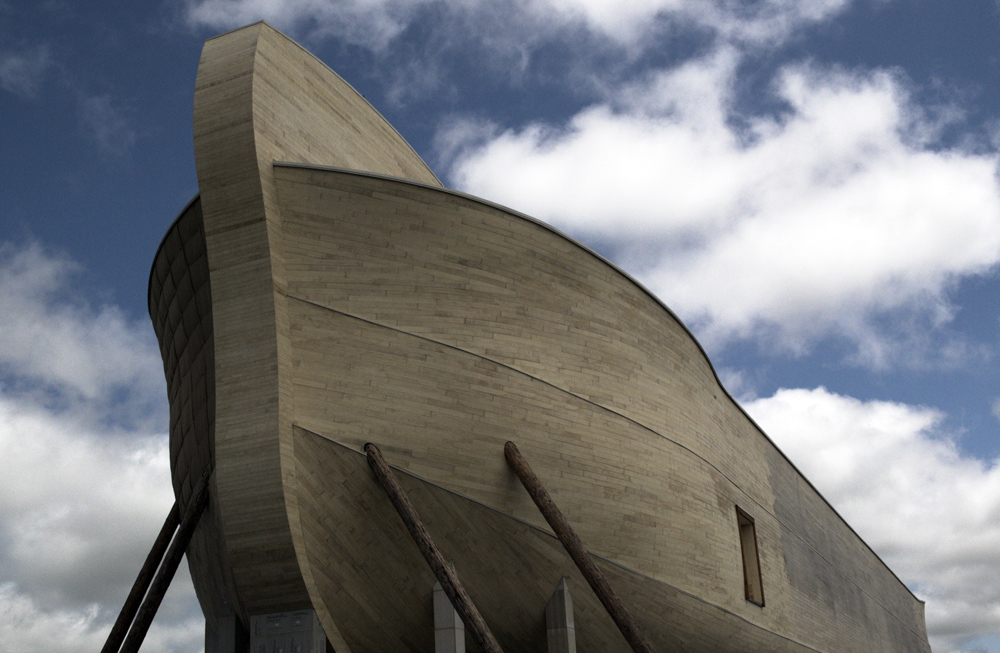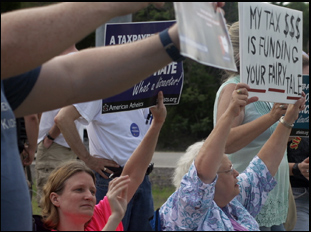At one point in “We Believe in Dinosaurs,” Doug Henderson, a lead exhibit designer on the Ark Encounter, a life-sized replica of Noah’s Ark set to open in Williamstown, Kentucky, is discussing the reasoning behind the decision to use baby brontosauruses inside the Ark rather than adults. Although co-directors Clayton Brown and Monica Long Ross never appear on screen, you can see their skepticism register on Henderson’s face as an explanation of how the space-conserving measure is also likely period-accurate, given that Noah would obviously prioritize taking creatures at the start of their lives if he was going to repopulate the earth, turns into a calm plea to the audience, telling the camera “I want you to see that I’m a normal person. I’m not crazy and any opportunity [to talk about Creationism], I’ll take.”
It’s a credit to Brown and Long Ross that Henderson doesn’t seem irrational for saying this, though the fact that dinosaurs would’ve been extinct by the time Noah set sail is just one among many should raise eyebrows in their second feature collaboration, which lays out the operation of Answers in Genesis, a Christian organization that has exploited the scientific unknown to bolster their beliefs in Creationism. Their founder Ken Ham insists that dinosaurs were born on the sixth day of Creation and has both PR and business savvy to spread anti-science rhetoric far and wide, first establishing a successful museum in 2007 with eyes towards an entire theme park that will begin with the Ark Encounter, which breaks ground in 2014 when Brown and Long Ross first set foot in Williamstown where an economically depressed community welcomes it with open arms.
However, as the development of the Ark Encounter wears on, there is much to be called into question, whether it’s the perversion of scientific fact that is the foundation for all of Answers in Genesis’ teachings or the potential economic impact of the theme park, which may not necessarily send the 1.4 million tourists a year traveling to town down Main Street, which is how the organization secured public funding for the project. The collision course that leads to the Ark’s opening provides a fascinating snapshot of America at this present moment where a desire to be fair by hearing out both sides of any argument has metastasized into a cancer where settled fact is reduced in weight to the self-serving and dubious claims made against it and the ability to promote is a more valuable currency than whatever’s being promoted. (It’s telling in “We Believe in Dinosaurs” that when a skeptic of the Ark Encounter appears on conservative talk radio show, he is told that he’ll “burn in hell,” but offered an olive branch in the form of plugging the website to his activist group.)
As “We Believe in Dinosaurs” premiered this weekend at the San Francisco Film Festival, Brown and Long Ross spoke about the making of the compelling documentary, never losing sight of their own beliefs while being respectful in presenting those of others.
Monica Long Ross: When we were doing our first film, “The Atom Smashers,” the Dover case, where they wanted to put intelligent design books in the curriculum in Pennsylvania, was in the background, so we thought from that point on, one of the biggest clashes in science and culture is religion and science. And when Clayton heard they were building a life-sized Noah’s Ark in the countryside of Kentucky near the Creation Museum, we thought okay, this is a story that looks at some of those issues.
Clayton Brown: We believe anyone can believe anything they want, so if you believe something in the church or in the home that’s counter to what’s common wisdom, that’s fine. But the difference with the Creationists is that they’ve created a science museum where they set out to prove that their science is true and they’ve created a science curriculum to teach kids that their science is true, so that’s a little different. So we felt like once they start engaging the world in that way, then it’s okay for us to engage with them.
This touches on larger issues culturally where there’s an interest in presenting both sides of an argument, but one side clearly has no basis in fact. Did filming in this particular cultural climate influence how you went about telling this story?
Clayton Brown: I don’t know that anything happening in the outside world changed or made us rethink the edit [because] it already was a real mirror to what’s happening and what has happened.
Monica Long Ross: We were aware the film echoes what the political climate is, and the themes raised by the film – what the sacred American doctrine of separation of church and state means to us all and how it protects education and policy – was a conversation we wanted to have, as well as the specter of global warming and science denial. But those films have been done, so we were doing the theory of evolution, which is the bedrock of the biological sciences. And if a certain portion of the American public can’t accept that, then where are we going?
Clayton Brown: But to your point about this artificial equality – say for example a climate change skeptic versus a climate change scientist – we were very conscious of that and discussed that the whole way through. We make the distinction between allowing [the Creationists] to present their belief systems and their lives and who they are in an unbiased way, [which] we view differently than presenting their science in an equal way with evolutionary science and saying to the viewer, okay, you decide. That’s obviously not the intention of the film at all, so we had many, many hours of conversation about how to [present them in such a way where they’re] not being distorted, but that’s different than presenting their science as legitimate, which we don’t believe it is.
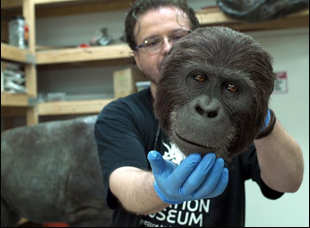
Clayton Brown: Interestingly, they made no demands. They had no expectations. There was no conversation about any kind of quid pro quo in terms of access. The truth is they’re so excited to tell the world and show the world what they’re doing because they’re so confident in it that they invite anyone and everyone to come to their press [conferences] and their interviews. They’re very forward-facing and a strong PR department, so they’re constantly inviting press and they know that they’re talking to non-believers, so it wasn’t really a matter of we’ll talk to you if you get our message out. It’s more like of course we’ll talk to you. We’ll talk to anybody.
Monica Long Ross: It’s almost as if several of them are ready to speak to people at any moment. There were times when we asked very hard questions that we thought maybe we wouldn’t get invited to the next [event] and we did. And for the opening of the Ark, there was press from all over the world, so they are very open to answering questions and to talking about what they believe.
Clayton Brown: Having said that, we did end up just really liking Doug. We didn’t really know what a Creationist looked like. We’re going into this world and [wondering] who are these people? And Doug’s just a great guy, so we found ourselves really liking him, and I think he really liked us.
Monica Long Ross: And I asked Doug at one point, “You like Clayton and I, don’t you?” And he said, yes. So I said, “So if your worldview is correct, we’re going to hell and you want to save us?” And he said, “I wouldn’t put it that way, but I want you to go to heaven because I do like you.” And it was a moment between us of what his goal is, keeping that in mind at the same time as [I was] disagreeing totally on his whole worldview on science, [which] was an interesting dynamic between us.
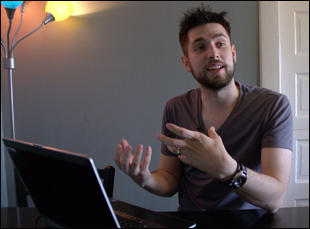
Monica Long Ross: Well, of course we were doing research and David was very active in blogging right then, talking about being a former Creationist and how he wanted to speak out to two groups – other young folks like himself who were never exposed to real science, a lot of [whom] had been home-schooled like he had been and he wanted to reach out to scientists and help them understand where the Creationists are coming from.
Clayton Brown: Specifically, he wrote an open letter to Bill Nye before a debate [with Ken Ham] because he thought, “Maybe I can help Bill Nye understand the Creationist mindset…
Monica Long Ross: So we contacted him and he was eager to talk. And it was interesting with Dan, who is known in the state of Kentucky as one of the only scientists who will go on record, give the interviews and isn’t afraid of being trolled by the museum. So his name came from a couple different people, and Dan was eager to participate because that’s one of his missions is to stand up for science education in the state of Kentucky. His family goes back to the time of Daniel Boone, and we were looking for Kentucky voices. We didn’t want people coming from the outside, telling [them] what they should do in their state. Instead, we kept it within Kentucky and I think that’s one of the reasons why the film has such resonance is that these are people fighting for their own state.
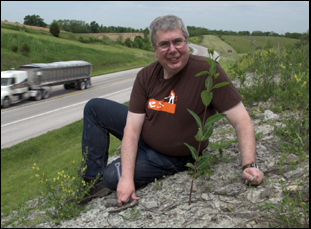
Monica Long Ross: We always do wide-ranging interviews and we interviewed a great many scientists who were of course pro-evolution and they were very academic and very good interviews, but at the same time, they weighted the film. We learned to trust the story — the building of the Ark and what these people believe and why they believe it rather than [concentrating] on academics. We learned that we didn’t need to do that. Audiences are smart and we can trust the audience and we [were able] to stick to the story.
What’s it like getting to the finish line?
Monica Long Ross: It’s great.
Clayton Brown: No doubt about it. We’re very proud of the film. We’ve been working so long on it and we’re really happy with the home it’s found here at the San Francisco Film Festival. They really seem to get the film and appreciate what we were up to and it’s just great to finally be able to stop working on it. [laughs]
Monica Long Ross: Yeah, we think we’re in the right place here, so we’re very happy to be here.
“We Believe in Dinosaurs” will screen at the San Francisco Film Festival on April 15th at 3 pm at the Roxie Theatre and April 21st at 2 pm at the Grand Lake Theatre.




